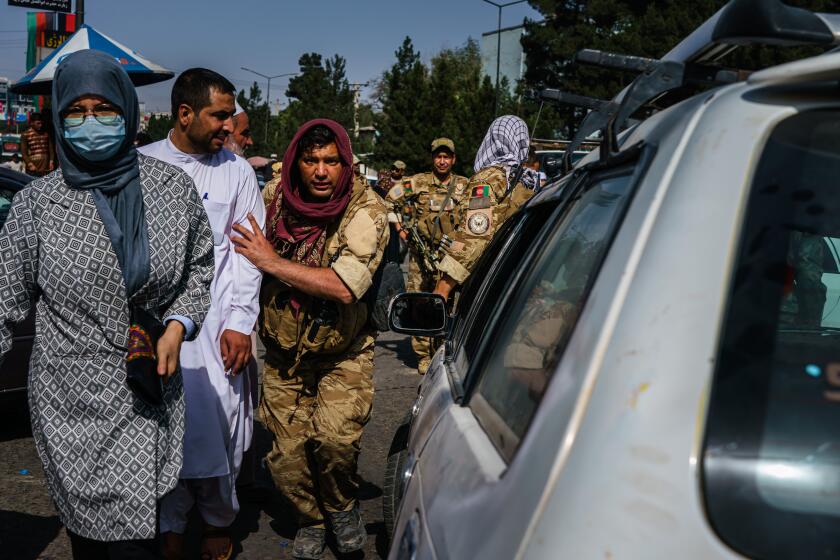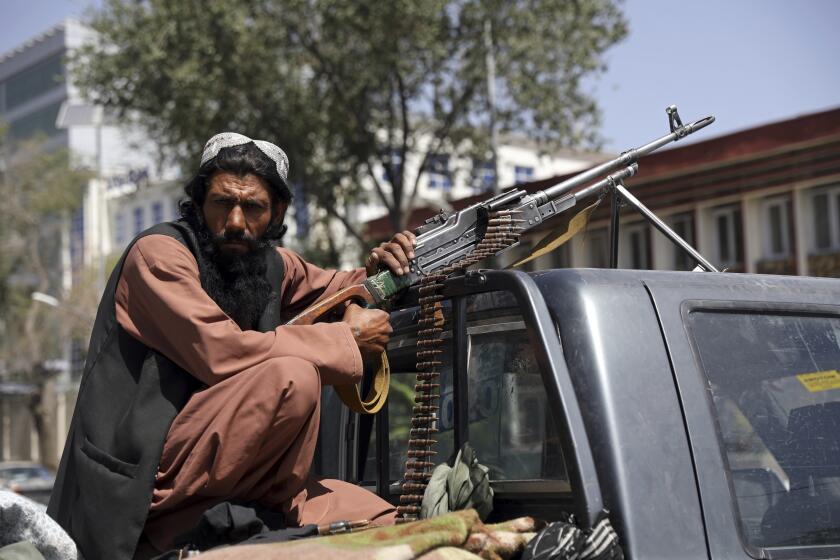Biden stands by Afghanistan withdrawal, says there was no good time to leave

WASHINGTON — President Biden, facing the biggest political crisis of his term, defended the chaotic withdrawal of U.S. forces from Afghanistan amid the rapid collapse of the country’s government, taking responsibility for ending the 20-year war but deflecting blame for the “hard and messy” events of recent days.
“I am president of the United States of America, and the buck stops with me,” Biden said in a speech from the White House on Monday afternoon. “I’m deeply saddened by the facts we now face. But I do not regret my decision to end America’s war ... in Afghanistan.”
For the record:
3:04 p.m. Aug. 16, 2021An earlier version of this article said the Trump administration’s 2020 agreement with the Taliban allowed for the release of 500 prisoners, many with ties to terror groups such as Islamic State and Al Qaeda. It allowed for the release of 5,000 prisoners.
While Biden claimed he had “planned for every contingency,” he acknowledged that the Taliban’s march into Kabul “did unfold more quickly than we anticipated.” The insurgent group’s success in taking over Afghanistan in just a few weeks, he argued, validated his decision to end America’s two-decade presence in the country.
“American troops cannot — and should not — be fighting in a war, and dying in a war, that the Afghans are not willing to fight for themselves,” Biden said. “We gave them every chance to determine their own future. What we could not provide them was the will to fight for that future.”
Biden was far more forceful in explaining his rationale for bringing U.S. troops home than in addressing the poorly executed departure, blaming Afghanistan’s political leaders who “gave up and fled the country.”
The president, determined to restore America’s values-based leadership on the world stage, asserted that “human rights must be the center” of U.S. foreign policy. But his statement appeared to be at odds with the chaos unfolding at Kabul’s international airport, where thousands of desperate Afghans flooded the tarmac, some clinging to the fuselage and wheels of a taxiing military aircraft.
He also deflected criticism for the U.S. failure to expedite the visa process for the tens of thousands of former interpreters and contractors who aided U.S. forces, saying that delay was in response to a request from the former Afghan government, which had hoped to forestall panic. He claimed, despite evidence to the contrary, that many Afghans waited to apply for visas out of hope their country’s government would remain in power.
Biden had returned from Camp David just hours before his appearance in the East Room, cutting short a week of vacation amid rising pressure to respond to a diplomatic, humanitarian and political crisis after Afghanistan fell into Taliban hands. Afghan President Ashraf Ghani fled the country on Sunday, and the Taliban within hours were holding court in the presidential palace, culminating its quick takeover of a nation of more than 39 million people.
The president, who departed the White House for Camp David shortly after his speech, emphasized his consistent view that the Afghanistan conflict had evolved from a counter-terrorism mission in the aftermath of the Sept. 11, 2001, attacks into a nation-building exercise that was draining U.S. resources. He acknowledged the unique pain of recent days for veterans, diplomats, humanitarian workers and Gold Star families.
Presenting his own actions as making good on his campaign promise to end the war, Biden implicitly rebuked American generals who convinced his predecessors to expand the war effort, often with rosy claims about the situation on the ground.
“I am now the fourth American president to preside over a war in Afghanistan,” Biden said. “I will not pass this responsibility on to a fifth president. I will not mislead the American people by claiming just a little more time in Afghanistan will make all the difference.”
Until stepping off Marine One in Washington just after 7 a.m., Biden had remained out of public view, relying on top aides to appear on the network morning shows to defend what even political allies described as the administration’s disastrous pullout.
Deadly chaos as thousands of Afghans swarm Kabul’s airport to try to flee following Taliban takeover, while others hunker down in homes.
Biden’s remarks did little to quell outrage on both sides of the political aisle. In comments that mirrored others by Republicans, Sen. Mitt Romney (R-Utah) blasted the president over his reluctance to reckon with what’s gone on in recent days.
“Contrary to his claims, our choice was not between a hasty and ill-prepared retreat or staying forever,” Romney said. “The decision to place a higher priority on a political promise than on the lives of innocent men, women and children is a stain on America’s reputation and undermines our credibility around the world.”
Sen. Mark R. Warner (D-Va.), the chair of the Senate Intelligence Committee, said his panel would investigate “why we weren’t better prepared for a worst-case scenario,” adding that the U.S. owes answers “to the American people and to all those who served and sacrificed so much.”
The president’s initial inconspicuousness during a major crisis also drew sharp criticism from lawmakers, who have called on the administration to do more to reassure the public and to follow through on Biden’s commitment to help the Afghans who aided the U.S. effort.
Rep. Seth Moulton (D-Mass.), an Iraq combat veteran, said calling Afghanistan’s fall “anything short of a disaster would be dishonest” and urged the White House to expedite the evacuation of vulnerable Afghans. “I have been calling on the administration to evacuate our allies immediately — not wait for paperwork, for shaky agreements with third countries, or for time to make it look more ‘orderly,’” he said.
This disaster, whether lawmakers admit it or not, has many fathers. Three presidents continued, and at times, expanded a war that cost the U.S. $2.6 trillion and the lives of more than 2,400 service members; hundreds of lawmakers voted to authorize it. Biden’s decision to end the war, based on deep personal conviction and the public’s waning commitment to Afghanistan, also followed a timeline his predecessor had put in place.
President Trump’s administration signed the 2020 agreement with the Taliban to withdraw U.S. forces from Afghanistan by May 2021. The agreement also allowed the release of 5,000 prisoners, many with ties to terrorist groups such as Islamic State and Al Qaeda. His decision to not involve Afghan leaders in negotiations demoralized and delegitimized the now toppled government in Kabul.
Trump, who criticized Biden this year for not sticking to the previous administration’s withdrawal timeline, issued a series of statements Monday attacking his successor’s “incompetence” and claiming that he would have done a better job of evacuating Afghan civilians to safety.
In a sign of the shifting political winds, the Republican National Committee on Monday quietly removed a section from its website that had featured praise of Trump for his “historic peace agreement with the Taliban.”
The Taliban has regained power after nearly 20 years. Here’s what that can mean for average Afghanis.
The 6,000 U.S. forces Biden deployed to Kabul over the weekend for a rescue mission, according to the State Department and the Pentagon, were tasked with evacuating American citizens and embassy personnel, a move that appeared, for the moment, to strand tens of thousands of vulnerable Afghans who served alongside U.S. forces.
The chaos at the airport Monday led the Pentagon to deploy an additional 1,000 troops on Monday, bringing the total to 7,000, more than double the size of the U.S. force Biden opted to draw down.
Pentagon spokesman John Kirby said Monday that the U.S. would give refuge to 30,000 vulnerable Afghans, although airlifting them to safety — something advocates have been seeking for months — is only starting to ramp up.
The eleventh-hour scramble has led to the kinds of chaotic, heart-wrenching scenes that Americans remember well from Vietnam and that Biden said were unlikely.
“There’s going to be no circumstance where you see people being lifted off the roof of an embassy of the U.S. in Afghanistan,” Biden told reporters last month.
On Sunday, however, U.S. helicopters were photographed swooping into the U.S. Embassy compound in Kabul to rescue diplomats and ferry them to the city’s international airport for evacuation.
More to Read
Get the L.A. Times Politics newsletter
Deeply reported insights into legislation, politics and policy from Sacramento, Washington and beyond. In your inbox three times per week.
You may occasionally receive promotional content from the Los Angeles Times.













